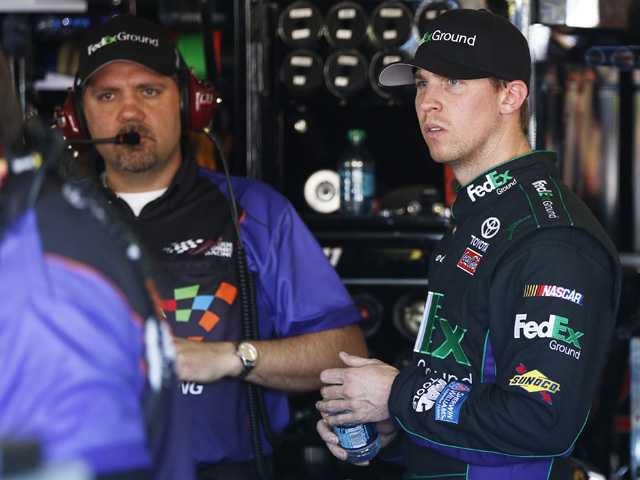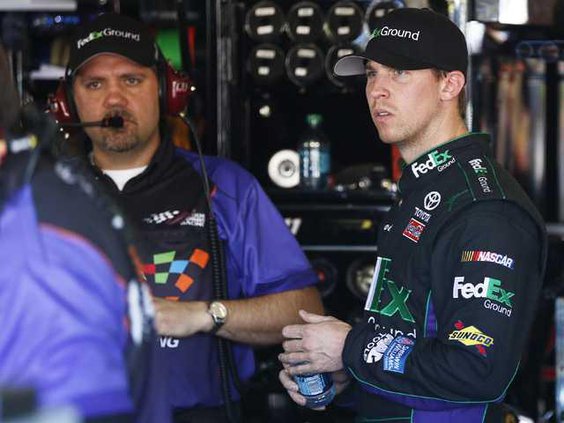BRISTOL, Tenn. — Denny Hamlin said Friday that he believes NASCAR was disrespectful by not contacting him before fining him $25,000 over critical comments about the new race car.
Hamlin said a bigger name would have at least gotten a courtesy call beforehand.
"That was the biggest complaint I had. If I was Jeff Gordon or Tony (Stewart), Dale (Earnhardt) Jr., or any Hendrick driver, they would have had a conversation before," Hamlin said. "Just to slap the fine on me and not tell me anything is what really, really bugged me. A lot. That felt like I had not earned my place in this sport, and I've grinded it out here for eight years and I really feel like I've done what it takes to earn the respect of both my peers and NASCAR. I feel like had I been somebody else, the outcome may have been different."
That's what played into Hamlin's anger last week when he stood firm in his refusal to pay the fine for criticizing the Gen-6 car following its second race of the season. He said he'd be suspended before he'd pay over a statement many considered mild made on pit road at Phoenix following a third-place run.
"I don't want to be the pessimist, but it did not race as good as our generation five cars. This is more like what the generation five was at the beginning," he said at Phoenix.
But NASCAR, which spent last year developing the car with heavy input from the manufacturers to improve the on-track product, has asked drivers to be careful in how they publicly talk about the car in an effort to build a strong public reception. The previous "Car of Tomorrow" was panned from the beginning, in part because the drivers picked it apart early.
Hamlin said after being fined he'd appeal the penalty, but announced Thursday on Twitter he would not drag his Joe Gibbs Racing team through the process. Still, he had informed NASCAR officials he would not write a check to cover the fine and was prepared for whatever action the sanctioning body chose to take against him. NASCAR has indicated it will garnish the money from his race winnings.
"I was prepared either way. They are ultimately not going to want to suspend me, that was the last resort," Hamlin said. "But I let my sponsors and everyone know that it was a possibility. It needed to end at some point. I didn't need to prove anyone wrong. It needed to end and move on from this point. By me saying I was not going to hand them a check and not going to give them anything, it was then in their court to decide what they were going to do with the fine."
Hamlin still believes he was right and NASCAR overreacted, and while not revealing the details of his conversation with chairman Brian France, he also believes NASCAR realizes it overreacted with the fine.
"In hindsight I really believe they overreacted and I believe they think they overreacted once they thought about it a little bit," he said. "To go through an appeal, just to prove that I'm right, I don't need to prove it. They are very, very sensitive about this car. This is their baby."
The fallout from the entire Hamlin episode is how drivers express themselves going forward.
Hamlin a week ago said he'd only talk about winning races and his newborn daughter, and indicated Friday he's unsure how candid he'll be with the media. Five-time champion Jimmie Johnson said NASCAR sent a message on how it wants drivers to handle issues with the car.
"It's crystal clear to me that if you have an issue about this car you go inside the (NASCAR) truck and talk about it," Johnson said. "You don't use one of these (microphone) or this (media) room to communicate that. You go up into the truck and talk about it."
Hamlin seemed prickly about the lack of support he received from drivers last week — "I think some of the peers of mine, at least the ones that have a backbone and had the nerve to stick up for what they know is right and wrong agreed," he said — but indicated the public shouldn't expect much more.
"Everyone wants to stay on NASCAR's good side, so that ultimately plays into a lot of what you hear in interviews," he said. "Ninety percent of what you hear on a weekly basis is just guys trying to stay on NASCAR's good side. There's very few that really give the honest and true truth."
Denny Hamlin felt disrespected by NASCAR fine





